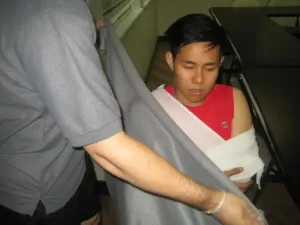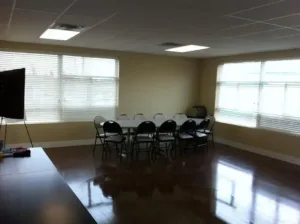Halifax First Aid stands out the best training service provider for first aid, cardiopulmonary resuscitation (CPR), and automated external defibrillation (AED) in Nova Scotia. A variety of training courses and classes with schedules throughout the week are offered to prospective trainees at the lowest rates in the area. Training courses all include certification with St Mark James and all courses are taught by trainers certified by this training provider. Enrolment is quick and easy through the on-line application form below, that can filled out at any time. E-mails, telephone calls, and walk-ins are also encouraged by Halifax First Aid.
Additional information of classes and schedules can be found on the Halifax First Aid website.
Course Rates

Halifax First Aid offers trainees a large selection of training and refresher courses at the most affordable costs. Taxes, certificates, workplace approved registration fees, manuals, and other training equipment are included in the initial enrolment fee, so you don’t have to worry about additional expenses. A full refund is also given to trainees who choose to drop out of course, given that they provide a 72-hour notice.
Training courses and classes
Training courses, stand-alone classes, private classes, and refresher courses are offered by Halifax First Aid. CPR training courses are divided into 3 levels: “A”, “C”, and “HCP”. All levels are inclusive of basic first aid and AED training. AEDs are machines that detect heart rhythms and apply needed electrical shock to help restart the heart. CPR and AED are components of Basic Life Support (BLS) guidelines used in CPR training courses. BLS guidelines were created by the American Heart Association to serve as a guide to rescuers in providing correct techniques during resuscitation. A lot of old steps and technique changes can be found in the latest BLS guidelines released in 2010 and will be taught during classes in Halifax First Aid.
Stand-alone classes are also available for trainees who do not wish to undergo an entire training course. Private classes are offered to companies or groups who want a separate schedule, usually for skill development and team building of employees. A list of classes offered by Toronto First Aid can be found below.
-
Halifax First Aid is committed to offering clean and conveniently located training classrooms throughout Halifax. This provider is committed to offering the best workplace approved first aid and CPR programs. Standard CPR and first aid
- Standard Childcare 1st aid and cardiopulmonary resuscitation
- Emergency 1st aid and cardiopulmonary resuscitation
- Emergency Childcare first aid and cardiopulmonary resuscitation (CPR)
- Basic Marine first-aid
- Babysitting 1st aid
- CPR “HCP”
- Cardiopulmonary resuscitation A and AED
- Cardiopulmonary resuscitation (CPR) -C
St Mark James Certification
Trainees who are able to finish and pass a training course are awarded workplace approved certificate, valid for 3 years throughout Canada. Refresher courses are offered twice a week for renewal of expiring or near-expiry certificates.
One of the many aspects of first aid is the ability to triage. This is usually done on emergency situations and in the emergency room of a hospital. A short lesson on triage is given below.
Learning About Triage – Three Levels of Priority
Individuals that take workplace approved training programs will learn about multiple casualty management which is also known as triage. During an emergency situation such as a calamity, a triage officer prioritizes victims in providing care. The three levels of priority are:
- Emergent – Life-threatening or potentially life-threatening injuries or illnesses requiring IMMEDIATE treatment; victims with Severe shock, Cardiac arrest, cervical spine injury, Airway compromise and altered LOC, Multi-system, Eclampsia
- Urgent – Serious illness or injury that is not immediately life-threatening (stable victims); victims with Fever, Minor burn less than 10 %, Minor musculoskeletal injury, Laceration, Dizziness
- Non-urgent – Episodic or MINOR injury or illness in which treatment may be delayed several hours or longer which increases morbidity
Halifax First Aid ensures you will be the best training possible! Enrol today!

